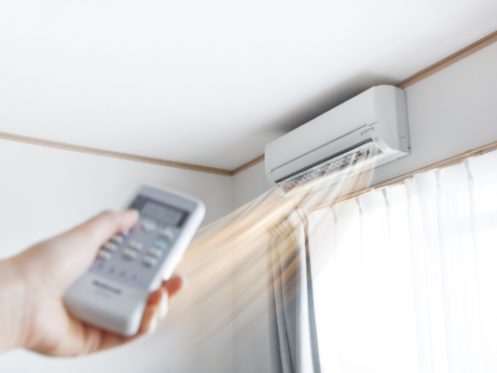There’s no denying the fact that the summertime heat can make it feel impossible to be indoors without some sort of home cooling system. If you’re in the market for a new air conditioning system, the main options are to invest in either a central air conditioning system or a ductless mini-split system. Understanding the main differences between the two can help you to determine which one best fits your needs and your budget.
What Is a Central Air Conditioning System?
A centralized air conditioning system is specifically designed to treat air at a central location and then disperse that treated air throughout the various rooms of your home. It distributes the air via a series of ductwork and registers that run throughout the walls and floors of your home. The treated air is transported by the force of a blower motor inside the central air conditioning components.
With the centralized air conditioning system, the warm air from the rooms inside of your home is pushed back into the return vents of your ductwork. It flows over an evaporator coil filled with cold refrigerant, which causes the warm air to release its heat. The cool, conditioned air returns to the rooms, and the process starts all over again. These systems are commonly installed in homes that already have existing ductwork connected to a furnace or other type of forced air heating system.
What Is a Ductless Air Conditioning System?
On the other hand, a ductless air conditioning system has two main components. These include the outdoor compressor unit and the indoor air handling unit. Most homes will have multiple indoor air handling units positioned strategically throughout their main rooms. Each air handler will be connected to the outdoor unit via conduit piping that runs directly through the exterior walls of your home.
Unlike centralized air conditioning systems, where the cold air is transported to the ducting and into your rooms, a ductless air conditioning system will create cold air directly at the indoor air handling unit. Each individual indoor unit can set its own specific temperature for that room or area of the house.
The Advantages of a Centralized Air Conditioning System
In order to determine the appropriate cooling system for your home, it’s very important to understand the main benefits that each type of system can bring. When it comes to a centralized air conditioning system, they’re fairly affordable to install and can be connected to existing ductwork.
Since the cold air is delivered through supply vents already established in each room, the system is virtually invisible on the inside of your home. The only unit that you’re going to see is the outdoor compressor unit.
The Advantages of a Ductless Air Conditioning System
Probably the biggest and most desirable advantage of ductless air conditioning systems is that they do not require the installation of ductwork to operate. This makes them the perfect solution for pre-existing homes where you don’t want to have to remove drywall and other materials to install ductwork.
Additionally, ductless units come in a very compact form that offers extreme flexibility in the zoning temperatures throughout your home. You can keep it nice and cool in your bedroom while raising the temperature slightly in your living room and other highly trafficked rooms of your home. Ductless mini-split systems are also well known to have some of the highest efficiency ratings in the cooling system market.
The Disadvantages of Centralized Air Conditioning
A big disadvantage of centralized air conditioning systems is that they can be extremely costly to install if you don’t have pre-existing ductwork in your home. Additionally, the ductwork will need to be cleaned thoroughly by a professional every few years in order to maintain optimal indoor air quality for your centralized air conditioning system.
The Disadvantages of Ductless Air Conditioning
One of the biggest disadvantages of ductless air conditioning systems is that they do cost more to install initially than centralized air conditioning systems that are coupled with a pre-existing heating system. Additionally, ductless air conditioning units may not be aesthetically pleasing due to their wall-mounted air handlers inside the home.
Quality AC Services
Tyler’s Heating & Cooling offers residential and commercial heating and cooling installation, repair and maintenance services. Contact Tyler’s Heating & Cooling today to get the professional assistance that you need with your home.

